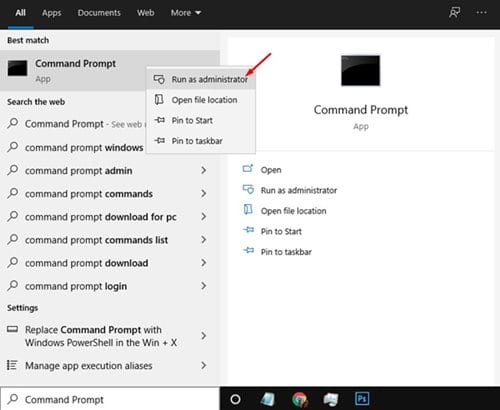
/windows-8-command-prompt-commands-5b3f79dbc9e77c0037818c2f.png)
- Complete list of command prompt commands windows 10#
- Complete list of command prompt commands code#
- Complete list of command prompt commands windows 8#
- Complete list of command prompt commands windows 7#
The cacls command is used to display or change access control lists of files. The break command is available in Windows XP and later versions of Windows to provide compatibility with MS-DOS files but it has no effect in Windows itself. The break command is available in all versions of Windows, as well as in MS-DOS. The break command sets or clears extended CTRL+C checking on DOS systems.
Complete list of command prompt commands windows 7#
The bootsect command is also available in Windows 7 and Windows Vista but only from the Command Prompt available in System Recovery Options.
Complete list of command prompt commands windows 10#
The bootsect command is available in Windows 10 and Windows 8.
Complete list of command prompt commands code#
The bootsect command is used to configure the master boot code to one compatible with BOOTMGR (Vista and later) or NTLDR (XP and earlier). Bootcfg is still available in Windows 10, 8, 7, and Vista, but it serves no real value since boot.ini is not used in these operating systems. The bootcfg command was replaced by the bcdedit command beginning in Windows Vista. The bootcfg command is available in Windows 10, Windows 8, Windows 7, Windows Vista, and Windows XP. The bootcfg command is used to build, modify, or view the contents of the boot.ini file, a hidden file that is used to identify in what folder, on which partition, and on which hard drive Windows is located. The BITS PowerShell cmdlets should be used instead.
Complete list of command prompt commands windows 8#
While the bitsadmin command is available in both Windows 8 and Windows 7, it is being phased out. The bitsadmin command is available in Windows 8, Windows 7, and Windows Vista. The bitsadmin command is used to create, manage, and monitor download and upload jobs. The bdehdcfg command is available in Windows 10, Windows 8, and Windows 7. The bdehdcfg command is used to prepare a hard drive for BitLocker Drive Encryption. The bcdedit command replaced the bootcfg command beginning in Windows Vista. The bcdedit command is available in Windows 10, Windows 8, Windows 7, and Windows Vista. The bcdedit command is used to view or make changes to Boot Configuration Data. The bcdboot command is available in Windows 10, Windows 8, and Windows 7. The bcdboot command is used to copy boot files to the system partition and to create a new system BCD store. The auditpol command is available in Windows 10, Windows 8, Windows 7, and Windows Vista. The auditpol command is used to display or change audit policies. The attrib command is available in all versions of Windows, as well as in MS-DOS. The attrib command is used to change the attributes of a single file or a directory. Support for ATM was removed beginning in Windows Vista, making the atmadm command unnecessary.

The atmadm command is available in Windows XP. The atmadm command is used to display information related to asynchronous transfer mode (ATM) connections on the system. Beginning in Windows 8, command line task scheduling should instead be completed with the schtasks command. The at command is available in Windows 7, Windows Vista, and Windows XP. The at command is used to schedule commands and other programs to run at a specific date and time.

The assoc command is available in Windows 10, Windows 8, Windows 7, Windows Vista, and Windows XP. The assoc command is used to display or change the file type associated with a particular file extension.
/cmd-commands-windows-57e599e75f9b586c35f1e965.png)
The arp command is available in all versions of Windows. The arp command is used to display or change entries in the ARP cache. The append command is not available in 64-bit versions of Windows. The append command is available in MS-DOS as well as in all 32-bit versions of Windows. The append command can be used by programs to open files in another directory as if they were located in the current directory.


 0 kommentar(er)
0 kommentar(er)
